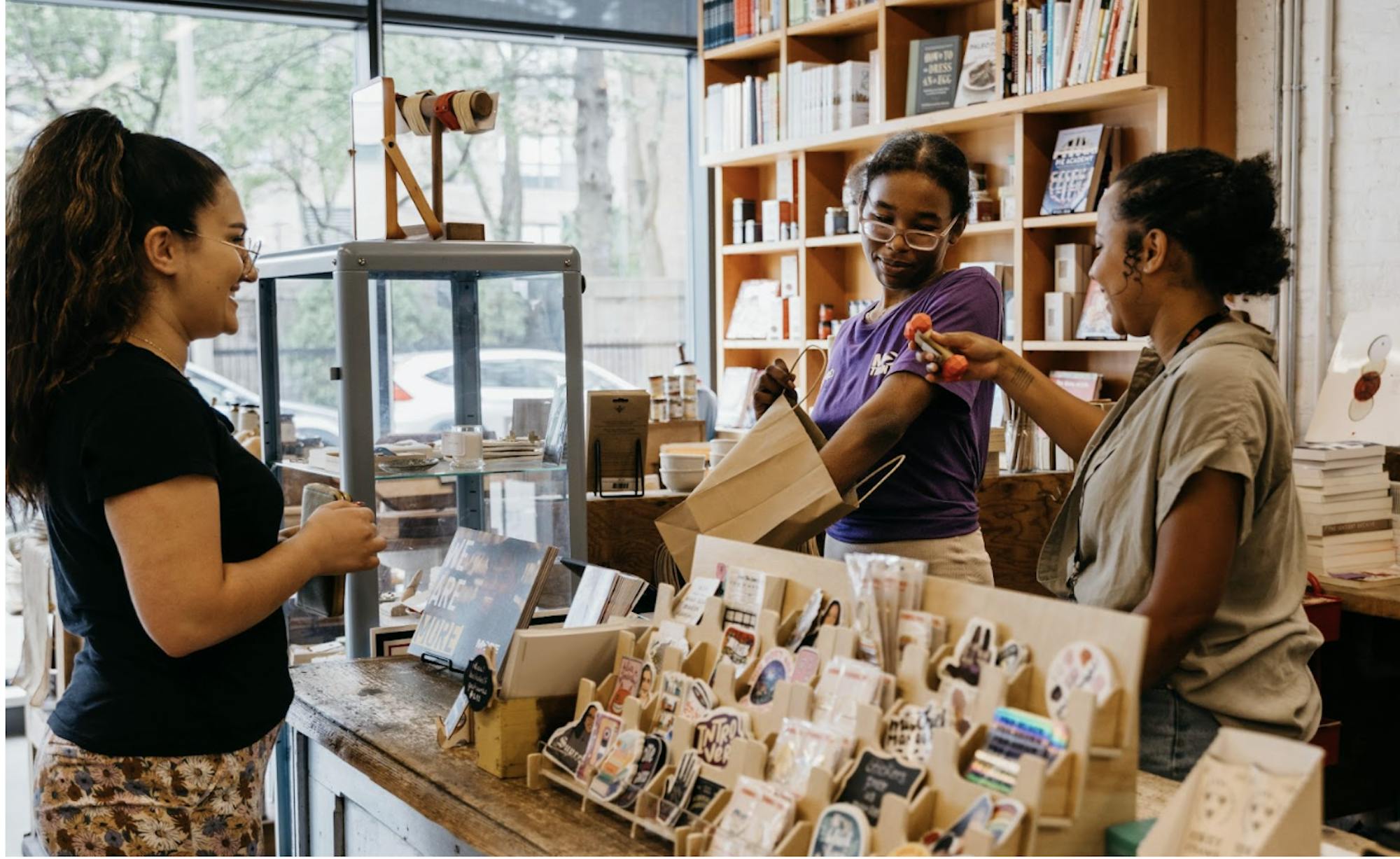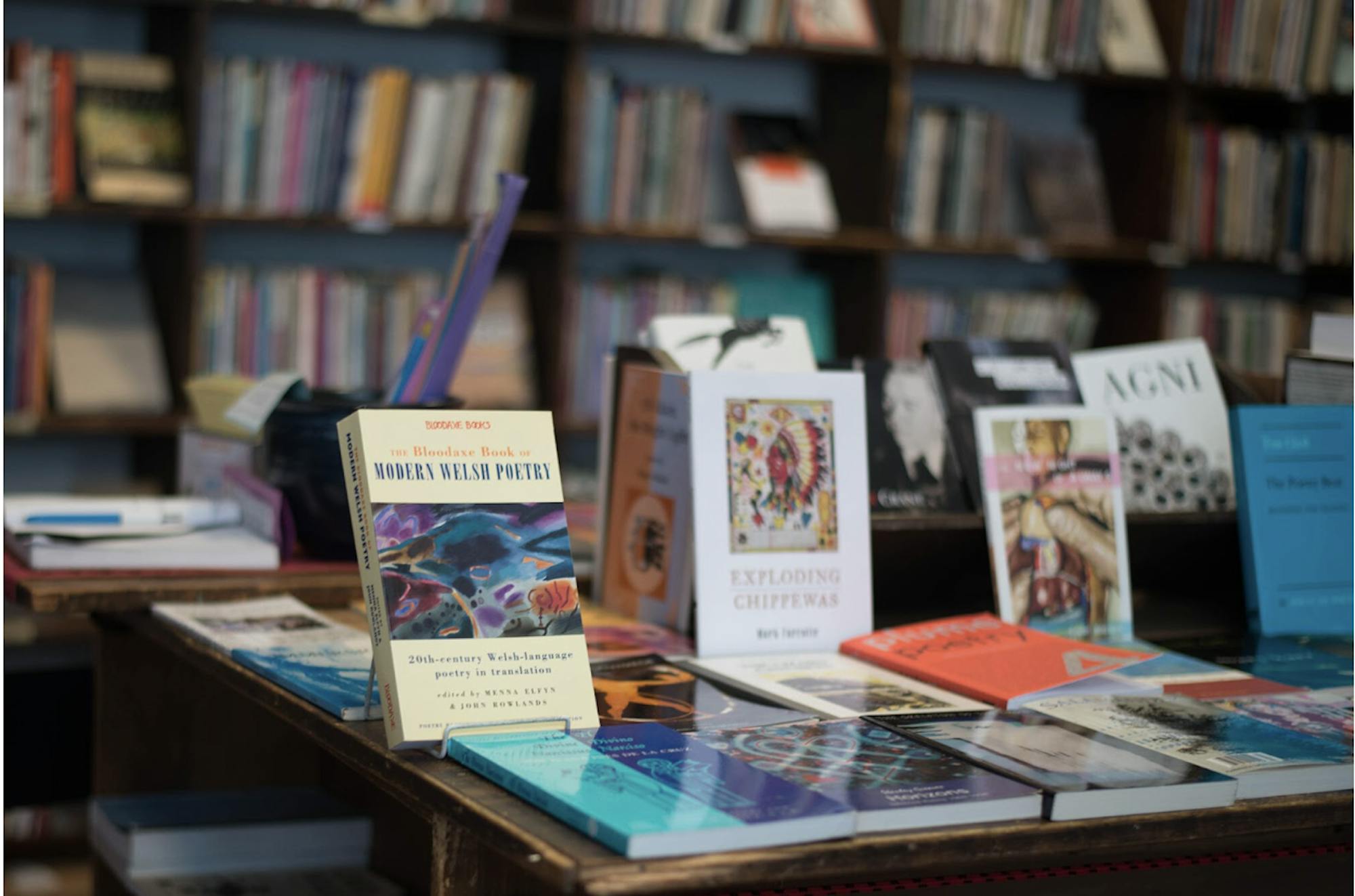As the days get shorter and the weather gets colder, more of us are likely to find solace in a warm room, reading an engrossing book. Deciding what to read, though, is complicated. Those choices can be influenced by conversations with friends, seeing something online and browsing the shelves of a bookstore.
Boston’s plentiful array of independent bookstores makes it easy to find new reading material; sometimes, perusing the shelves can be just as fun as reading itself. Two such local stores are the almost century-old Grolier Poetry Book Shop in Cambridge and the community-focused nonprofit More Than Words in the South End.
Hidden in a secluded corner at 6 Plympton St. next to the Harvard Book Store, walking into Grolier Poetry Book Shop is like getting transported into a different world.
The establishment boasts an impressive collection of myriad poetic styles, traditions and time periods despite only taking up about 400 square feet.
James Fraser, manager of the Grolier Poetry Book Shop, explained the history of the store in an interview with the Daily.
“The Grolier is an all-poetry bookshop, the oldest all-poetry bookshop in the country and maybe the oldest all-poetry bookshop in the world,” Fraser said.
Fraser’s love for literature led him to work for the bookstore.
“When a spot to manage the Grolier opened up, I decided I could think of almost nothing better to do,” he said. “I’ve managed the shop now for around three years and before that I was a part-time bookseller.”
Founded in 1927 by Adrian Gambet and Gordon Cairnie, the bookstore used to sell books from the founders’ personal collection in addition to poetry. It became a gathering place for poets, including Seamus Heaney, Charles Olson and Robert Pinsky; when Cairnie died, Louisa Solano purchased the shop and turned it into an all-poetry bookstore in 1979.
Currently, the shop is owned by the Menkiti family, which purchased it from Solano in 2006. Under new management, the Grolier also runs a small press that has published a number of books.
The store’s walls feature the portraits of its many distinguished visitors from over the years, including those of the renowned poets William Carlos Williams, T.S. Eliot, Ezra Pound and Allen Ginsberg. Many of these authors had personal connections with Cairnie.
Aside from selling poetry books, the Grolier holds events such as poetry readings and book signings.
“About once a week we have poets come in, who usually have a new book of poems out, and they will read from their book,” Fraser said. “Usually it’s one, two or three poets. However, we’ve had up to seven or eight when we’ve had really big readings, depending on what it’s for; say, a poetry anthology.”
Fraser underscored that engaging with bookshops in-person builds community.
“At bookstores, you can congregate, you can meet new people, you can create a community of writers. We try to do that here, through our reading series,” he said.

More Than Words bookstore is pictured.
Another Boston-based bookstore that strives to create a sense of community is More Than Words.
Since its founding in 2004 by Jodi Rosenbaum, More Than Words, which has locations in Boston and Waltham, has changed the lives of many youth who are in the foster care system, court-involved, out of school or experiencing homelessness.
As an advocacy attorney, Rosenbaum recognized the disproportionate challenges faced by young people who were involved in the foster care system. She decided to use books as a vehicle for change, to help empower those youth through employment.
Naomi Parker, the chief advancement officer at More Than Words, explained that people exiting the foster care system have significantly more encounters with the justice system; Parker called this the “trauma-to-prison pipeline.”
“At the same time, there’s a huge link between the child welfare system and homelessness,” Parker explained. “Young people are removed from their homes for their own safety, but then, when they turn 18 and they age out of the foster care system, they become homeless.”
The nonprofit employs around 50–70 youth shaped by these experiences at the Boston site, and serves over 300 youth each year. Their employment at More Than Words not only provides them with a steady job but also plays a crucial role in their personal growth and social integration.
Jayden, a senior associate at More Than Words, shared his experience working with the bookstore.
“Everyone here’s story is different, but what makes it special is that we are trying to do something to build our lives to change our lives,” Jayden said. “But while doing that, we are also part of a company, this company that helps youth build [yourself] within a bookstore.”
More Than Words extends its impact beyond books, offering an array of products including donated clothing and personal care items from other nonprofits.
“We’re not just a bookstore. We’re an event space. We’re a clothing business. We have mobile bookstores, pop-up shops, in-person and online sales,” Parker said.
The bookstore also provides personalized support for its employees.
“They make sure you’re going to be good before you start the job,” Jayden said. “If you’re homeless, if you don’t have a way to get here or you’re going to school, they come up with a plan so that you’re able to come smelling good, feeling good and doing good every day so that you can work at your full potential.”
Youth employees work at More Than Words for about a year, and then become “graduates,” who pursue education or work elsewhere while receiving career support from the organization.
Outside of the bookstore, More Than Words engages in policy advocacy work related to challenges faced by youth.
“A lot of our policy advocacy work is … helping engage young people to talk about their experiences, how it relates to these systems and use that information with legislators at the statehouse, with the city, … with district attorneys, to try and make some change in the system,” Parker said.
While these Boston-based bookstores help foster community engagement, they also face their own challenges. Online retailers such as Amazon, who sell books at a reduced price, are a main source of competition.
“Bookstores everywhere have a lot of trouble staying profitable,” Fraser said. “One thing I can say is, you probably won’t get rich in terms of money with a bookstore, whereas you will be very rich spiritually.”
A physical bookstore has an irreplaceable atmosphere that simply cannot be replicated online.
“At bookstores, you can have this sort of organic discovery of books that you never knew existed just by looking at the shelves,” Fraser said.






